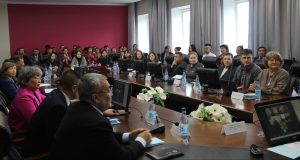Climate action

SDG 13. Combating climate change consists of 3 national indicators (https://stat.gov.kz/ru/sustainable-development-goals/goal/13/). Overall, there is a positive trend. For example, in 2018-2021, the total annual greenhouse gas emissions decreased from 404.5 to 340.84 million tons of CO2 equivalent. A register of green technologies and projects, domestic manufacturers and suppliers of green technologies and equipment has been created.
Sustainable development and caring for the environment are the main priorities of our university. We recognize the importance of proactive actions to mitigate climate impacts and are committed to implementing strategies that will help minimize our carbon footprint and contribute to a sustainable future. This policy is aimed at defining the measures that the university takes to protect the environment and achieve goals to reduce greenhouse gas emissions.
We strive to reduce greenhouse gas emissions as a result of our activities. This includes switching to renewable energy sources, improving the energy efficiency of buildings and infrastructure, and optimizing transportation processes.
We will actively work to reduce the consumption of resources such as water and electricity, as well as to implement recycling and reuse practices.
We believe it is important to raise awareness among students, staff, and the local community about climate change and sustainable development. Educational programs and initiatives will contribute to the formation of environmentally responsible behavior.
Conducting audits of energy consumption and introducing technologies that reduce energy consumption, such as LED lighting, automation systems, and thermal insulation.
Investing in solar panels, wind turbines, and other renewable energy sources to meet some of our energy needs.
The winners were announced
The results of the annual regional photo contest “ecology of the Native Land” Between Schools of Uralsk and the region were summed up at zhangir Khan University.
The competition was organized by teachers of the educational program “Industrial Ecology”.

